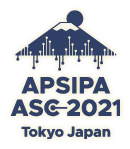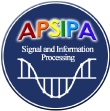Winter School - Distinguished Lecturer Program
December 13 (Mon.), 9:00 AM – 17:20 PM
Poster
Introduction
The APSIPA ASC 2021 Winter School plans to bring world class academicians and researchers to teach the latest in signal and information processing. The winter school will cover various topics on computer vision, machine learning, statistical signal processing, 3D point cloud processing, video processing, and wireless communications.
Registration
Please register from here.
Registrants are limited to 500, first come, first served.
Program
Chair
Prof. Mingyi He, VP of APSIPA, Northwestern Polytechnical University, China
Co-Chairs
Prof. Nakamasa Inoue, Tokyo Institute of Technology, Japan
Prof. Shuai Wan, Int Center for Info Acquisition and Processing, Northwestern Polytechnical Univ, China
Time Table & Speakers
9:00 - 9:10
Opening Speech by APSIPA leader
9:10 - 10:00
Prof. Wan-Chi Siu (Hong Kong Polytechnic University, China)
- Lecture 1
- Developing Attention Mechanism from Conventional Machine Learning to Deep Learning
- Biography
- Wan-Chi Siu, PhD, DIC, Life-FIEEE, is Emeritus Professor (formerly Chair Professor, HoD(EIE) and Dean of Engineering Faculty) of Hong Kong Polytechnic University and Research Professor of Caritas Institute of Higher Education in Hong Kong. He is Life-Fellow of IEEE and was a PhD graduate (1984) of the Imperial College London, Vice President, Chair of Conference Board and core member of Board of Governors of the IEEE SP Society (2012-2014), and President (2017-2018) of APSIPA, and has been Guest Editor/Subject Editor/AE for IEEE Transactions on CAS, IP, CSVT, and Electronics Letters. Prof. Siu has been Keynote Speaker and Invited Speaker of many conferences, published over 500 research papers in DSP, transforms, fast algorithms, machine learning, deep learning, super-resolution imaging, 2D/3D video coding, object recognition and tracking, and organized IEEE society-sponsored flagship conferences as TPC Chair (ISCAS1997) and General Chair (ICASSP2003 and ICIP2010). He was an independent non-executive director (2000-2015) of a publicly-listed video surveillance company and chaired the First Engineering/IT Panel of the RAE(1992/93) in Hong Kong. Recently, he has been a member of the IEEE Educational Activities Board, the IEEE Fourier Award for Signal Processing Committee (2017-2020), the Hong Kong RGC Engineering-JRS Panel (2020-2022), and some other IEEE technical committees.
10:00 - 10:50
Prof. Ce Zhu (University of Electronic Science and Technology of China, China)
- Lecture 2
- Substitute Training for Black-Box Adversarial Attacks: A GAN-based Approach without any Real Training Data
- Biography
- Ce Zhu is currently a Professor at the University of Electronic Science and Technology of China, Chengdu, China. His research interests include image/video coding and communications, 3D video, visual analysis, perception and applications. He has served on the editorial boards of a few journals, including as an Associate Editor of IEEE Transactions on Image Processing (2016-2020). He has also served as a Guest Editor of a few special issues in international journals, including as a Guest Editor in the IEEE Journal of Selected Topics in Signal Processing (2020). He is a Fellow of the IEEE and of the IET, an APSIPA Distinguished Lecturer (2021-2022), and was also an IEEE Distinguished Lecturer of Circuits and Systems Society (2019-2020).
10:50 - 11:40
Prof. Huihui Bai (Beijing Jiaotong University, China)
- Lecture 3
- Exploration of depth super-resolution based on deep learning
- Biography
- Huihui Bai received her B.S. degree and her Ph.D. degree from Beijing Jiaotong University in 2001 and 2008, respectively. She is currently a professor in Institute of Information Science in Beijing Jiaotong University. Her research interests are image/video processing, image/ video coding and transmission. She has published over 80 journal and conference publications, one U.S. granted patent, one Australian innovation patent, 8 national invention patents. She has hosted many scientific research projects, such as Natural Science Foundation of China, Natural Science Foundation of Beijing and Natural Science Foundation of Jiangsu. Furthermore, she received Beijing science and technology achievement award (first class, second author), Shanxi science and technology achievement award (third class, fourth author) and Shanxi higher education science and technology achievement award (first class, fourth author). Additionally, she was selected as one of Beijing higher education young elite teacher project, star track of Microsoft Research Asia and creative fund from CCF and Tencent.
14:00 - 14:50
Prof. Zhiyong Wang (The University of Sydney, Australia)
- Lecture 4
- Recent Advances on Video Summarization
- Biography
- Zhiyong Wang is an Associate Professor and Associate Director of the Multimedia Laboratory at the School of Computer Science, The University of Sydney, Australia. He received his B. Eng. and M. Eng. Degrees in electronic engineering from South China University of Technology, Guangzhou, China, and his Ph.D. degree from Hong Kong Polytechnic University, Hong Kong. His research interests focus on multimedia computing and its applications in agriculture, earth observation, health, and medicine, including multimedia information processing, analysis, retrieval, summarization, and recognition (e.g., human action recognition and affective analysis), and multimedia data mining, multimedia content creation, human-centered multimedia computing, remote sensing, and pattern recognition. He is an Associate Editor of ACM Computing Surveys and Neurocomputing, and the President of Australia Pattern Recognition Society (APRS).
14:50 - 15:40
Prof. Jae-Young Sim (Ulsan National Institute of Science and Technology (UNIST), Korea)
- Lecture 5
- Glass Reflection Removal for Images and 3D Point Clouds
- Biography
- Jae-Young Sim received the B.S. degree in electrical engineering and the M.S. and Ph.D. degrees in electrical engineering and computer science from Seoul National University, Seoul, Korea, in 1999, 2001, and 2005, respectively. From 2005 to 2009, he was a Research Staff Member, Samsung Advanced Institute of Technology, Samsung Electronics Company, Ltd. In 2009, he joined the School of Electrical and Computer Engineering, Ulsan National Institute of Science and Technology (UNIST), Ulsan, Korea, where he is now a Professor of the Graduate School of Artificial Intelligence and the Department of Electrical Engineering and also serving as Dean of the College of Information and Biotechnology. From 2021, he serves as an Associate Editor of the Journal of Visual Communication and Image Representation. His research interests include computer vision, image, video, and 3D visual processing. He has published more than 70 technical papers in international journals and conferences.
15:40 - 16:30
Prof. Shogo Muramatsu (Niigata University, Japan)
- Lecture 6
- Development of Cyber-Physical System (CPS) for Active Control of River Channels
- Biography
- Shogo Muramatsu received the B.E., M.E. and Ph.D. degrees from Tokyo Metropolitan University, Tokyo, Japan, in 1993, 1995 and 1998, respectively. From 1997 to 1999, he worked at Tokyo Metropolitan University. In 1999, he joined Niigata University, where he is currently a Professor in the Faculty of Engineering. From 2003 to 2004, he was a Visiting Researcher at the University of Florence, Italy. His research interests include multidimensional signal processing, multi-rate systems, image and volumetric data restoration, video analysis, and embedded vision systems. Prof. Muramatsu is a Senior Member of IEEE and IEICE (Institute of Electronics, Information, and Communication Engineers of Japan) and a Member of APSIPA (Asia-Pacific Signal and Information Processing Association) and ITE (Institute of Image Information and Television Engineers of Japan). He served as an Area Editor of IEICE Transactions of Electronics, Communications and Computer Sciences from 2017 to 2019. He is currently an Associate Editor of the IEEE Transactions on Signal Processing and an APSIPA Distinguished Lecturer.
16:30 - 17:20
Prof. Yan Chen (University of Science and Technology of China, China)
- Lecture 7
- Smart Radio Sensing
- Biography
- Yan Chen is currently a Professor with the School of Cyber Science and Technology at the University of Science and Technology of China. His research interests include multimodal sensing and imaging, multimedia signal processing, and wireless multimedia. He is a co-author of “Reciprocity, Evolution, and Decision Games in Network and Data Science” (Cambridge University Press, 2021) and “Behavior and Evolutionary Dynamics in Crowd Networks: An Evolutionary Game Approach” (Springer, 2020), as well as co-author of over 200 technical papers including more than 100 IEEE journal papers. He is the Associate Editor for IEEE Transactions on Network Science and Engineering, IEEE Transactions on Signal and Information Processing over Networks, and on the Editorial Board for MDPI Sensors. He is the Chair for APSIPA Signal and Information Processing Theory and Methods (SIPTM) Technical Committee, a Distinguished Lecturer for APSIPA, the Secretary-General for the CES Young Scientist Network Multimedia Technical Committee. He is an organizing co-chair of PCM 2017, a special session co-chair of APSIPA ASC 2017, the 10K Best Paper Award Committee member of ICME 2017, the multimedia communications symposium lead chair of WCSP 2019, an Area Chair for ACM Multimedia 2021.

